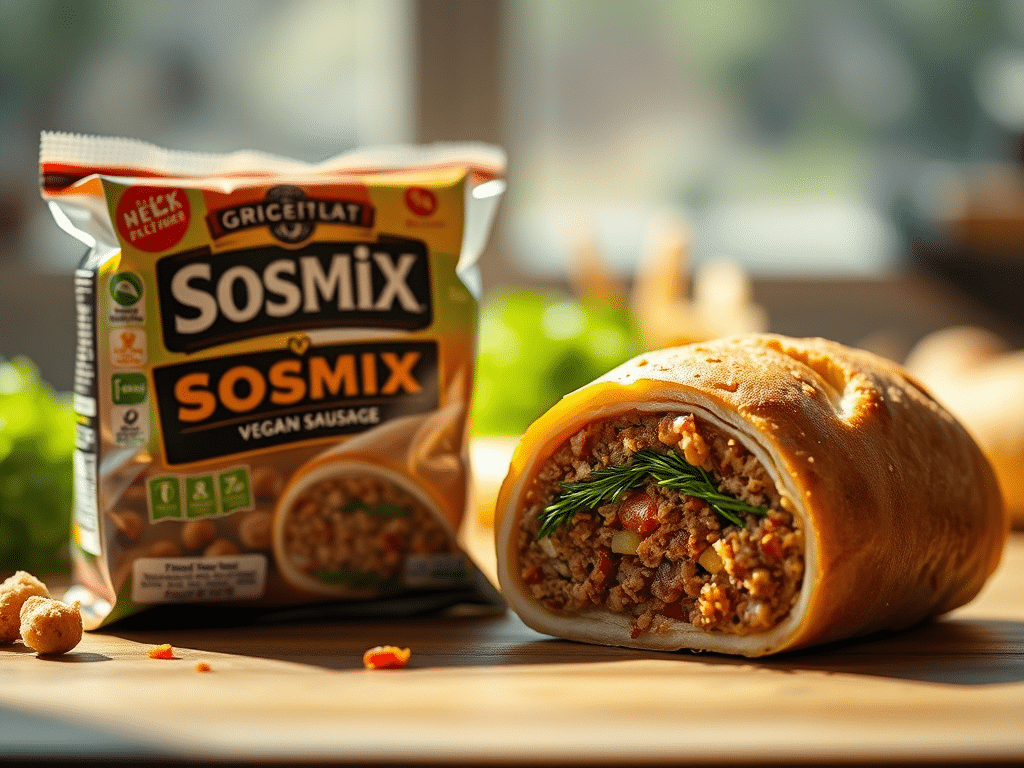Introduction
In recent years, the rise of veganism has transformed the food landscape. The humble Greggs vegan sausage roll has become a symbol of this shift. But how did we get here? Let’s explore the history of meat alternatives, from the days of Sosmix to the modern offerings at Greggs in the context of the evolution of meat alternatives.
The Greggs Revolution
Greggs, a beloved British bakery chain, took a bold step by introducing the vegan sausage roll. This decision not only catered to a growing demographic but also sparked widespread interest in plant-based diets. The Greggs vegan sausage roll quickly became a cultural phenomenon, proving that meat alternatives could be both tasty and accessible, highlighting their role in the evolution of meat alternatives.
The Origins of Meat Alternatives
The concept of meat alternatives isn’t entirely new. As far back as the 6th century, tofu emerged in China as a staple protein source, highlighting early vegetarian influences. In the early 20th century, John Harvey Kellogg, a pioneer of health food, developed “Protose,” a meat substitute made from peanuts and wheat gluten. These innovations laid the groundwork for both vegetarian and vegan alternatives we know today, contributing to the evolution of meat alternatives.

Key Figures in the Evolution of Veganism
While vegetarianism has ancient roots, veganism as we know it began to take shape in the 20th century. In 1944, Donald Watson co-founded The Vegan Society in the UK, coining the term “vegan” and advocating for a lifestyle free from all animal products. His work laid the foundation for the modern vegan movement.
Another key figure, Leslie Cross, was instrumental in developing the philosophy of veganism further, emphasizing the ethical treatment of animals and promoting plant-based innovations. In recent times, figures like Dr. Michael Greger have contributed significantly to veganism by highlighting its health benefits through evidence-based research.
A Journey Through Meat Alternatives
The history of meat alternatives is rich and varied. In the 1980s, options were limited. My own experience as a vegetarian child highlights this scarcity. My mother, unfamiliar with vegetarianism, turned to Sosmix, one of the few available options at the time. Sosmix, a dry mix for making meat-free sausages, was a staple in our household. Despite her initial struggle, my mother eventually embraced vegetarianism herself.
The Rise of Modern Alternatives
The late 20th century witnessed a surge in the development of meat alternatives. Brands like Quorn and Beyond Meat emerged, offering more variety and improved taste. This period marked a significant shift toward plant-based eating, driven by increasing awareness of health, environmental, and ethical concerns.
According to a report by The Good Food Institute, the plant-based meat market grew by 45% from 2019 to 2020. Retail sales data from NielsenIQ covering 13 European countries shows that sales of plant-based foods have grown 6% in 2022 – and 21% since 2020 – to reach €5.8 billion, reflecting the increasing consumer demand for sustainable food options and the ongoing evolution of meat alternatives.
A Personal Connection
My mother’s journey mirrors the broader societal shift. If she were alive today, I have no doubt she would embrace veganism. Her openness to compassion and willingness to challenge social norms exemplifies the potential for change, even within older generations. Education plays a crucial role in this transformation, helping break through ingrained beliefs.
The Greggs Impact

The success of the Greggs vegan sausage roll marks a significant milestone in the evolution of meat alternatives. It demonstrates how companies can lead the charge in promoting sustainable, ethical eating habits. Greggs has opened the door for more innovation in plant-based foods, making them a mainstream choice and furthering the evolution of meat alternatives.
Conclusion
The journey from Sosmix to Greggs showcases the incredible progress in the world of vegan and vegetarian alternatives. From ancient tofu to early vegan pioneers like Donald Watson, and modern innovations by Beyond Meat and Greggs, the development of plant-based foods reflects a growing commitment to sustainability and compassion. As more people embrace vegan lifestyles, the demand for diverse, flavorful options will continue to grow. The Greggs vegan sausage roll stands as a testament to this evolution, proving that change is not only possible but also deliciously rewarding. Through education and openness, we can continue to break down social norms and create a more compassionate world.
By focusing on the evolution of vegan and vegetarian alternatives, we can appreciate the strides made and look forward to an even more inclusive food future. Whether you’re a lifelong vegan or just curious about plant-based options, the journey from Sosmix to Greggs offers something for everyone. Understanding the evolution of meat alternatives is key to this journey.
Before you go…
If you’re vegan or just looking for cruelty-free supplements, chocolate, or meal kits, here are a few brands worth checking out.
Dr. Vegan make fully plant-based supplements with clear ingredients. Use code DR15 to get 15% off.
The links above are affiliate links. If you click through and buy something, I may earn a small commission at no extra cost to you.

